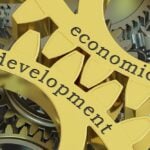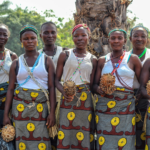The East Asia and Pacific region continues to outperform much of the world, but creating more quality jobs and sustaining growth will require ambitious reforms amid ongoing global uncertainties, according to the World Bank’s October 2025 East Asia and Pacific Economic Update. Regional growth is projected at 4.8 percent in 2025, slightly down from 5.0… [Read More]
World Bank
Boosting Jobs and Economic Growth Through Entrepreneurship in Latin America and the Caribbean
Latin America and the Caribbean face a persistent low-growth cycle, but the World Bank’s new Latin America and the Caribbean Economic Review: Transformational Entrepreneurship for Jobs and Growth highlights entrepreneurship as a key driver to create jobs, boost productivity, and accelerate innovation. The region’s growth is forecast at 2.3 percent in 2025 and 2.5 percent… [Read More]
Investing in Jobs Crucial for Boosting Economic Growth in Europe and Central Asia
Economic growth in Europe and Central Asia (ECA) has slowed but the region has demonstrated resilience despite ongoing global and regional challenges, according to the World Bank’s latest Europe and Central Asia Economic Update: Jobs and Prosperity. Regional GDP is projected to grow by 2.4 percent in 2025, down from 3.7 percent in 2024, largely… [Read More]
World Bank: Timely Reforms Essential for Bangladesh’s Inclusive Growth
Bangladesh’s economy rebounded in the second half of FY25 after early-year disruptions, driven by strong exports, record remittances, and a rise in foreign exchange reserves, according to the World Bank’s latest Bangladesh Development Update. The report notes that while the country is expected to maintain medium-term growth, urgent reforms are essential to sustain momentum and… [Read More]
World Bank: Sri Lanka’s Economic Recovery Still Fragile Amid Ongoing Challenges
Sri Lanka’s economy has shown signs of improvement, with recent performance indicating a steady recovery. However, the World Bank warns that this recovery remains incomplete, as growth continues to lag behind pre-crisis levels and poverty rates remain significantly higher than before the crisis. Sustaining the recovery will require maintaining macroeconomic stability, implementing structural reforms, and… [Read More]
South Asia’s Economy Remains Robust but Faces Impending Slowdown
South Asia’s economy is expected to grow strongly at 6.6 percent in 2025, maintaining its position as the world’s fastest-growing region. However, a slowdown is projected ahead, with growth forecast to ease to 5.8 percent in 2026, according to the World Bank’s latest South Asia Development Update: Jobs, AI, and Trade. The report warns that… [Read More]
World Bank: Sub-Saharan Africa’s Growth Remains Steady but Job Creation Lags
Sub-Saharan Africa’s economy continues to demonstrate resilience, with growth projected to reach 3.8 percent in 2025, up from 3.5 percent in 2024. The modest acceleration is driven by easing inflationary pressures and a gradual recovery in investment despite ongoing global economic uncertainty. The number of countries facing double-digit inflation has dropped significantly—from twenty-three in late… [Read More]
MENA, Afghanistan, and Pakistan See Improved Economic Prospects
The World Bank’s latest economic report on the Middle East, North Africa, Afghanistan, and Pakistan (MENAAP) highlights signs of recovery and an improved outlook for the region. Economic growth is projected to reach 2.8 percent in 2025 and 3.3 percent in 2026. Despite this positive momentum, the report cautions that global uncertainty, changing trade policies,… [Read More]
Is Ending Poverty Possible? Global Efforts and Challenges Explained
The question of whether it is possible to end poverty has long inspired debate and action worldwide. Global leaders and organizations like the United Nations assert that poverty can indeed be eradicated through deliberate human effort and collective will. Nelson Mandela famously stated that poverty, much like slavery and apartheid, is man-made and can be… [Read More]
How Early Learning Assessments Are Unlocking Children’s Potential in Sint Maarten
In a classroom on the island of Sint Maarten, children read together in both English and Dutch under the encouraging gaze of their teacher. This simple scene represents a historic shift in the island’s education system — for the first time, educators and policymakers are equipped with national-level data to understand how well children are… [Read More]
New Serbian Initiative Strengthens Early Warning Systems Across Western Balkans
A new three-year initiative aimed at boosting disaster and climate resilience in the Western Balkans was officially launched in Belgrade, focusing on Serbia, Albania, and North Macedonia. Supported by the Government of Italy and implemented by the United Nations Office for Disaster Risk Reduction (UNDRR) and partners, the project seeks to accelerate targeted disaster risk… [Read More]
New Strategy Paves the Way for Safer, Climate-Resilient Comoros
Comoros, a small island developing state in the Indian Ocean, faces increasing risks from tropical cyclones, sea level rise, erratic rainfall, and extreme heat. According to the World Bank’s Climate Risk Profile, “once-in-a-century” rainfall events could occur nearly twice as often by mid-century, while rising seas threaten to inundate coastal communities. With nearly 40% of… [Read More]
EU, Federated States of Micronesia Launch Major Water and Sanitation Initiative
The European Union (EU) and the Federated States of Micronesia (FSM) have officially launched the “Strengthening Water and Sanitation Governance in FSM” (FSM WASH) project in Palikir, marking a new milestone in their long-standing partnership. The event brought together key government officials, EU representatives, and development partners to celebrate FSM’s leadership in advancing sustainable water… [Read More]
Building Zambia’s Future: The Impact of Investing in Women and Girls
In May, Cathy Gumbo from Chisamba District in Zambia shared her story. At just 16 years old, she faced difficulties staying in school because her family could not always afford essentials like uniforms, books, and sanitary supplies. With a bursary from the GEWEL Project, Cathy now attends school regularly and is beginning to plan for… [Read More]
Thailand’s Path to High Income: The Role of Climate-Smart Investment
The World Bank’s new Country Climate and Development Report indicates that while Thailand faces significant climate risks, strategic and timely development investments can unlock new economic growth opportunities. Focused on adapting to extreme weather, reducing emissions, and promoting green exports, these investments are crucial for Thailand to realize its aspiration of becoming an inclusive and… [Read More]
AGF and Women’s World Banking Forge Strategic Partnership to Empower Women Entrepreneurs in Africa
The African Guarantee Fund (AGF) and Women’s World Banking (WWB) have signed a Memorandum of Understanding (MoU) aimed at strengthening women’s role in Africa’s economy by expanding access to finance and support for women-led businesses. The partnership highlights the shared commitment of both organizations to advancing women’s economic empowerment through finance, technical support, and advocacy…. [Read More]
Bhutan Can Harness Benefits of Migration Through Strategic Reforms, Says World Bank
Migration of Bhutan’s educated youth and skilled professionals has become a growing concern for the Royal Government of Bhutan and international partners, according to a new World Bank report released today. Titled Migration Dynamics in Bhutan: Recent Trends, Drivers, and Implications, the report builds on discussions from the South Asia Mobility Conference held in Thimphu… [Read More]
Sarawak Partners with World Bank to Boost Governance and Long-Term Economic Growth
In a landmark initiative to future-proof its economy, Sarawak has signed a strategic agreement with the World Bank and Malaysia’s Federal Government, marking the start of major reforms in State-Owned Enterprise (SOE) governance and public financial management. The three-year partnership aims to enhance the management of public resources by improving SOE governance and aligning budget… [Read More]
World Bank: Digital Transformation Key to Boosting Public Sector Productivity
Malaysia is leveraging GovTech to deliver faster, more trusted public services—a digital transformation the World Bank highlights as central to enabling private sector growth and creating high-quality jobs, accelerating the country’s path toward high-income status. The World Bank’s new report, From Bytes to Benefits: Digital Transformation as a Catalyst for Public Sector Productivity, credits Malaysia’s… [Read More]
Back to Basics: Why Investing in Disaster Risk Management is Crucial for Global Development
On May 8, 1947, the World Bank approved its very first loan of $250 million—equivalent to about $3.5 billion in today’s terms—to the French government to help rebuild its economy after the devastation of the Second World War. Seventy-eight years later, the World Bank is still helping countries recover from disasters, but its mission has… [Read More]
IFAD Achieves Landmark US$1 Billion in Sustainable Bonds to Boost Development
The International Fund for Agricultural Development (IFAD) has surpassed US$1 billion in sustainable bond issuances since its first issuance in June 2022. This milestone was reached with the twelfth bond issued in September 2025, marking a significant expansion of IFAD’s ability to finance rural development projects globally. By the end of 2024, the first US$646… [Read More]
Government Unveils Civil Support Package to Aid Ukraine Amid Ongoing Challenges
The Government of Sweden has announced a new civil support package for Ukraine totaling SEK 1.145 billion for 2025, aimed at addressing the country’s most pressing reconstruction, development, and humanitarian needs ahead of the approaching winter. This package focuses on strengthening Ukraine’s resilience amid ongoing Russian aggression while providing critical assistance to vulnerable populations. Key… [Read More]
Gavi Achieves Unprecedented Success in Vaccination Efforts Worldwide
In 2024, Gavi-supported vaccination programmes saved a record-breaking 1.7 million lives, 400,000 more than in 2023, according to Gavi’s Annual Progress Report. The achievement highlights significant gains in immunising children across lower-income countries, including those facing major humanitarian and conflict-related challenges. Beyond health benefits, Gavi’s programmes generated nearly US$ 20 billion in economic value in… [Read More]

























